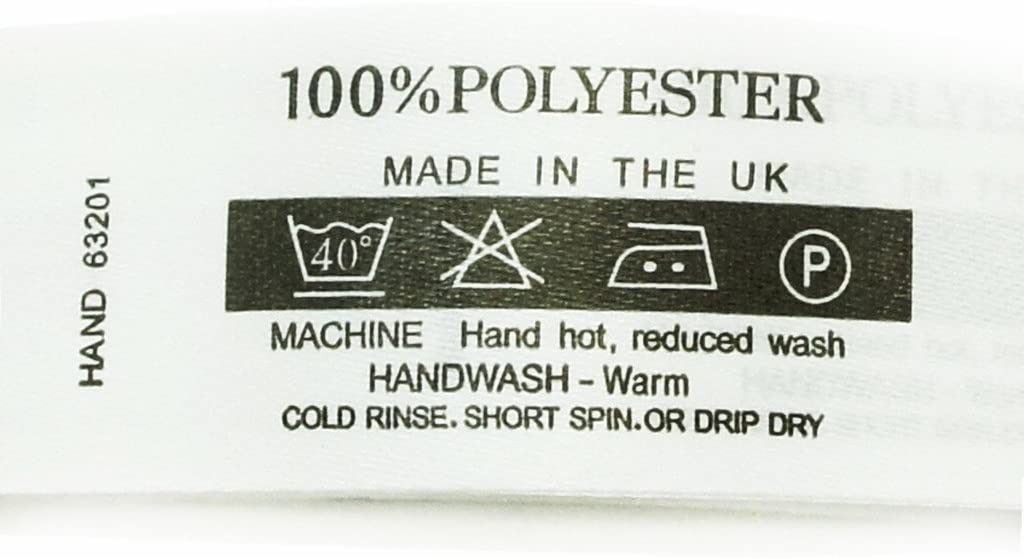Polyester is a plastic-like material made from coal, oil, and water. It’s made in a lab and is used to create many things such as home furnishing, seatbelts, tents, and clothing. Because it’s mass-produced it has become a cheap material to buy.
Somehow, polyester has snuck its way into fashion. You might have noticed that a lot of apparel is made with polyester. Manufacturers say adding in this chemically-created material makes your shirt feel stronger and softer, but we believe we were tricked.
These are the 6 reasons why polyester should be avoided at all costs.
1. Polyester encourages fashion overproduction and waste.
Polyester made up 60% of global fiber production in 2019, at 55 million metric tons produced annually, according to a presentation by Oerlikon at ITMA 2019 (cited in Textile Exchange’s 2019 Preferred Fiber and Materials Report). Cotton comes in a distant second.
Brands have gravitated toward polyester because it’s often a more affordable and easier textile to get ahold of than natural fibers. You just put in an order with one of the thousands of synthetic fiber mills around the world, it’s produced and then shipped to the cut-and-sew factory. That’s opposed to cotton, which can go through wild price swings due to drought, natural disasters, and political crises. Or animal fibers, which are difficult to standardize and industrialize without animal abuse being baked into the system.
Before polyester was discovered in the 1940s, our textile production was limited by the amount of land devoted to growing cotton and linen, or raising sheep and silkworms. Being able to produce polyester in a factory decoupled production from land area. According to McKinsey, between 2000 and 2014, global clothing production doubled. Not coincidentally, 2002 is when demand for polyester surpassed cotton. Most of that increased fashion production has been made possible by polyester.
2. Polyester is made from fossil fuels.
What you call polyester is technically polyethylene terephthalate or PET plastic molded into filaments that are then woven into fabric. It’s made in a chemical reaction between ethylene glycol and terephthalic acid, and these chemicals are derived from fossil fuels, air, and water.
In a perfect future world, where we’ve decarbonized our global economy and we’re putting carbon back in the ground instead of pulling it out, it would be hard to justify polyester, because it relies on pulling more oil and coal out of the ground.
3. Polyester can’t be recycled.
There’s one Japanese factory operating at a commercial scale that will recycle their own polyester from Patagonia into fresh polyester. The rest of the global output of polyester can’t be recycled using today’s technology. Used textiles of pure cotton have value since it can be mechanically recycled, but as soon as you add more than 5% polyester, it becomes unusable. As a result, polyester and polyester-blend scraps used in fashion are going into the landfills, being incinerated, or ending up in our ocean. Even if we do start collecting and recycling polyester, the PET degrades a little more during each loop. It can’t be recycled forever. It’s also very confusing for a consumer to see that brands are labeling themselves as ‘sustainable’ yet their clothing is made from polyester. It’s clearly not sustainable if you’re using a material that isn’t recyclable and toxic.
4. Polyester is not biodegradable, and sheds toxic microfibers.
While cotton, wool, and silk will completely biodegrade within a few months to a few years, as a plastic, polyester will take hundreds of years to completely biodegrade. Before that happens, however, it will degrade into little microfibers. These microfibers slough off certain types of clothes into the air when we are wearing them, and flow into our waterways from our washing machines. Recent research estimates that globally, “176,500 metric tons of synthetic microfibers — chiefly polyester and nylon — are released every year.”
And we’re eating, breathing, and drinking them. It’s estimated we ingest a credit card’s worth of microplastic every week. This is dangerous for us and aquatic life, because these microfibers can attract carcinogenic toxins. These are carried into our bodies through the ingestion of microfibers, which can then lodge in our gut.
5. Polyester gets smelly.
While it’s billed as “sweat-wicking,” meaning it doesn’t get heavy when it gets wet like cotton does, after a few wears and washes, you’ll start to notice that it’s hanging on to your odor.
Not to go into too much gory detail, but skin germs found in sweat feast on chemicals, which synthetic fibers can't absorb, therefore creating an environment for smelly bacteria to grow. All signs point to polyester being the number one worst fabric for skin.
6. Polyester is toxic.
The harmful effects of polyester fibers start at the very beginning of the manufacturing process, which requires a lot of water, oil, and coal. The first chemical reaction happens at very high temperatures and creates a monomer. The second chemical reaction produces a polymer. After that, the polymer’s long strips dry, get broken up, melted, and spun into fibers.
During the final steps, the fibers are treated with chemicals to achieve the right color and thickness, as well as flame or water resistance. Also, some clothes get treated with additional chemicals to protect from mildew and parasites.
The number of chemicals required to produce and process polyester is mind-blowing. What is even more shocking is that our skin comes in direct contact with these chemicals.
Synthetic materials are heat sensitive. When your body warms up the clothes you wear, chemicals in fibers are released. Since polyester restricts the flow of air, trapped chemicals are reabsorbed by the skin. The effects can vary from mild skin irritation to dermatitis.
Perfluorochemicals (PFCs) are added to clothes to protect from stains and wrinkles. But studies suggest that PFCs could be linked to cancer. In some studies, these chemicals are suspected of causing liver and kidney damage. Some clothes are treated with formaldehyde to protect pieces from shrinking. This chemical is known to trigger asthma symptoms.




Leave a comment
This site is protected by hCaptcha and the hCaptcha Privacy Policy and Terms of Service apply.